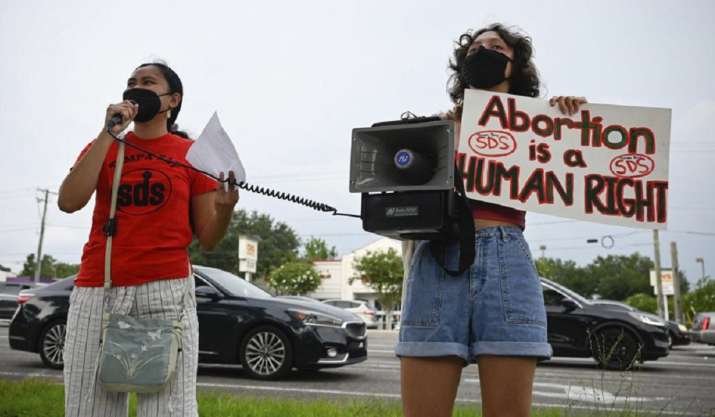
Chrisley Carpio and Victoria Hinckley, 20, speak to protesters during an abortion rights rally at Temple Terrace on Saturday, June 25, 2022
Highlight
- The Texas Supreme Court stayed a lower court order late Friday.
- The order states that clinics can continue to perform abortions.
- The hearing is to be held at the end of this month.
Abortion ban in America: The Texas Supreme Court late Friday blocked a lower court order that said clinics could continue to perform abortions, just days after some doctors began seeing patients after the collapse of Rowe v. . It was not immediately clear whether Texas clinics that resumed seeing patients this week would close services again. The hearing is to be held at the end of this month.
The whiplash of Texas clinics turning patients away, rescheduled them, and now potentially canceling re-appointments — all in the space of a week — has sparked confusion and nationwide confusion since Row’s overturned. Scramble depicted. Earlier this week an order from a Houston judge convinced some clinics they could temporarily resume abortions up to six weeks into the pregnancy. Soon after Texas Attorney General Ken Paxton asked the state’s Supreme Court, which was stocked with nine Republican judges, to temporarily halt the order.
“These laws are confusing, unnecessary and cruel,” said Center for Reproductive Rights attorney Mark Herron after the order was issued Friday night. Clinics in Texas stopped performing abortions in the state of nearly 30 million people after the US Supreme Court last week overturned Roe v. Wade and abolished the constitutional right to abortion. Texas had technically left the abortion ban on the books for the past 50 years, while Roe was in place.
A copy of Friday’s order was provided by attorneys for the Texas clinics. It could not immediately be found on the court’s website. Abortion providers and patients across the country are struggling to navigate the evolving legal landscape around abortion laws and access.
In Florida, a law banning abortion after 15 weeks went into effect Friday, the day a judge called it a violation of the state’s constitution and said he would sign an order temporarily blocking the law next week. The ban could have wider implications in the South, where Florida has wider access to the process than its neighbors.
Abortion rights have been lost and returned in the span of a few days in Kentucky. A so-called trigger law that placed an almost complete ban on the procedure went into effect last Friday, but a judge on Thursday blocked the law, meaning only two of the state’s abortion providers can resume seeing patients — right now. For.
Legal wrangling is almost certain to continue to cause chaos for Americans seeking abortions in the near future, with court rulings able to increase access at a moment’s notice and an influx of new patients from state-heavy providers.
Even when women travel to out-of-state states with abortion restrictions, they may have fewer options for terminating their pregnancies because prosecution likely follows them.
Planned Parenthood of Montana this week stopped providing drug abortions to patients who live in states with restrictions “to reduce the potential risk to providers, health center staff, and patients in the face of a rapidly changing landscape” .
Planned Parenthood North Central State, which offers the procedure in Minnesota, Iowa and Nebraska, is telling its patients that they must take both pills in the diet in a state that allows abortions.
The use of abortion pills has been the most common way to terminate a pregnancy since 2000, when the U.S. Food and Drug Administration approved mifepristone—the main drug used in the drug abortion. When taken with misoprostol, a medicine that causes womb emptying spasms, it makes the abortion pill.